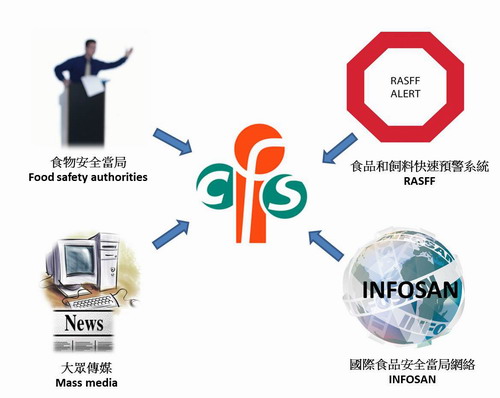
Food Safety Focus ( 92nd Issue, March 2014 ) – Incident in Focus
Review of Food Incidents in 2013
Reported by Dr. Albert KK NG, Medical & Health Officer,
Risk Management Section,
Centre for Food Safety
Food safety is a major concern for consumers in many parts of the world. The Centre for Food Safety (CFS) monitors food incidents reported by local and overseas mass media and authorities every day. The CFS also participates in international food safety information networks, such as the International Food Safety Authorities Network (INFOSAN) established by the World Heath Organization and the Food and Agriculture Organization, as well as the "Rapid Alert System for Food and Feed (RASFF)" of the European Union to further broaden our network of intelligence. The food incident surveillance system is an established channel that enables the CFS to respond readily to events with potential food safety implications.

Intelligence Network of the Food Incident Surveillance System
Safeguarding Food Safety
The CFS takes prompt follow up actions on food incidents which are of local relevance and public health significance. All such food incidents have to go through risk assessment so that hazards associated with food or food ingredients are scientifically evaluated and potential risk to the population is assessed. The risk assessment result would facilitate formulation of appropriate risk management actions and risk communication messages to protect public health, which include liaising with relevant authorities overseas, issuing alerts to the trade and public, conducting sales check and taking food samples for testing, making public announcement and initiating recall or even issuing prohibition order.
Food Incidents in 2013
In 2013, the CFS identified about 1 000 food incidents, a figure similar to that in 2012. The majority (98.1%) of the cases were incidents of non-local origin. The CFS identified some additional 300 food recalls due to undeclared allergens, of which three related products were found available locally. In response to these incidents, the CFS issued 287 trade alerts, 169 food incident posts, 14 press releases and 10 food alerts in 2013.
Important Food Incidents
The followings are examples of food incidents with media and public concern in 2013:
-
Suspected contamination of milk formula by Clostridium botulinum
In early August 2013, the New Zealand Ministry for Primary Industries (MPI) reported that ingredients suspected of contamination by Clostridium botulinum were used in the production of a milk formula sold globally. The CFS liaised closely with the New Zealand Consulate General and food authority on this food incident. A local importer then initiated a precautionary product recall on another milk formula which went through the same production line. The CFS took samples of New Zealand milk products from different local retail outlets for pathogen testing and all were tested negative. In view of the potential impact, a telephone hotline was set up to address public enquiries and concerns. By the end of August, MPI confirmed that the food incident was a false alarm as the bacteria identified was actually a non-toxin-forming strain of Clostridium which posed no food safety concern. The milk formula concerned has resumed normal sale afterwards.
-
Maleic acid in food products from Taiwan
Media reported that a food ingredient, modified starch, and some starch-based food products (e.g. fish paste products, noodles, taro- and tapioca-balls) had been detected by the Taiwan authority in May 2013 as containing maleic acid to increase viscosity. The CFS immediately contacted the authority concerned and was informed that it was linked to the abusive use of maleic anhydride during the production of modified starches, some of which were in turn used to manufacture food products. According to the risk assessment conducted by the CFS based on the reported levels, occasional consumption of maleic acid tainted starch-containing foods is not likely to pose any significant health risk. Moreover, no affected batches of the food products were found to be available in the local market. Nevertheless, the CFS took samples of food products which might contain modified starches imported from Taiwan from different retail outlets for testing and all test results were satisfactory.
-
British beef lasagne contained horse meat
The CFS received notification from the RASFF in February 2013 that a British company detected horse DNA in its own-brand of beef lasagne. The main concern was that the horse meat had not undergone tests appropriate to its nature, in particular the screening of a veterinary drug called phenylbutazone at the time of its production. The CFS immediately alerted the trade and liaised with relevant authorities in the UK and the European Commission. Sale of the affected product was stopped and a recall was also initiated by the importer concerned. This incident has reflected that public concerns on food authenticity incidents sometimes intermingled with food safety concerns.
Conclusion
The CFS has a food incident surveillance and response system in place to detect and manage food incidents in a timely manner through risk.

